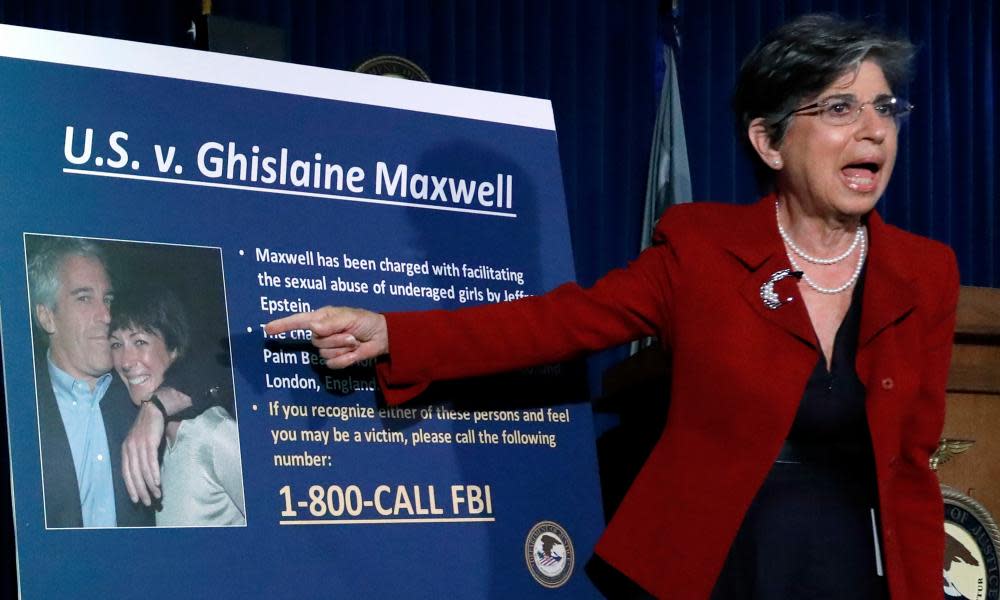Ghislaine Maxwell must stay in jail due to 'extreme flight risk', prosecutors say

Ghislaine Maxwell should not get bail while awaiting trial for her alleged involvement in Jeffrey Epstein’s child sex trafficking because she is an “extreme risk of flight”, prosecutors said on Monday, firing back at her legal team’s arguments that she is not.
Related: Ghislaine Maxwell requests bail release due to 'unprecedented' Covid-19 risks
Authorities arrested Maxwell, 58, on 2 July at her luxurious 156-acre property in Bradford, New Hampshire. The socialite faces a maximum of 35 years in federal prison if convicted at trial.
In the filing, prosecutors pointed to the circumstances surrounding Maxwell’s arrest, writing that when FBI agents arrived at her “remote” home, she had “tried to flee”. On searching the property, they found a “cellphone wrapped in tin foil” which they allege was “a seemingly misguided effort to evade detection … by law enforcement”.
“The government respectfully submits that the defendant cannot meet her burden of overcoming the statutory presumption in favor of detention,” read the court filing by Audrey Strauss, the acting US attorney for the southern district of New York.
“There are no conditions of bail that would assure the defendant’s presence in court proceedings in this case. Accordingly, any application for bail should be denied.”
Maxwell is a citizen of France, prosecutors pointed out, saying that the country “does not extradite its citizens to the United States pursuant to French law”. Maxwell also has US and UK passports.
The filing added that “the defendant has not only the motive to flee, but the means to do so swiftly and effectively. The defendant appears to have access to extensive sources of wealth.”
The Manhattan US attorney’s office’s arguments were in dramatic opposition to her lawyer’s claims on Friday. A court appearance is scheduled for Tuesday for Maxwell’s arraignment and bail arguments.
When FBI agents arrived at Maxwell’s “remote” home and approached the front door, “they announced themselves as FBI agents and directed the defendant to open the door.
“Through a window, the agents saw the defendant ignore the direction to open the door and, instead, try to flee to another room in the house, quickly shutting a door behind her,” prosecutors wrote. “Agents were ultimately forced to breach the door in order to enter the house to arrest the defendant, who was found in an interior room in the house.
“Moreover, as the agents conducted a security sweep of the house, they also noticed a cellphone wrapped in tin foil on top of a desk, a seemingly misguided effort to evade detection, not by the press or public, which of course would have no ability to trace her phone or intercept her communications, but by law enforcement,” they claimed.
After Maxwell’s arrest, FBI agents spoke with the security guard, who claimed that Maxwell’s brother “had hired a security company staffed with former members of the British military to guard the defendant at the New Hampshire property, in rotations”.
Maxwell’s lawyers have contended that she did not go into hiding after Epstein’s arrest last July. They claimed that she contacted federal prosecutors through her attorneys after he was apprehended, and “maintained regular contact” with authorities. Maxwell had simply wanted to maintain a low profile because of the “carnival-like” media scrutiny, they claimed.
Maxwell’s lawyers cited the Covid-19 crisis in arguing for bail, saying:
“As this court has noted, the Covid-19 pandemic represents an unprecedented health risk to incarcerated individuals… simply put, under these circumstances, if Ms Maxwell continues to be detained, her health will be at serious risk and she will not be able to receive a fair trial.”
Maxwell’s lawyers proposed bail conditions, including a $5m bond and travel restrictions.
Authorities have said that Epstein, a convicted sex offender, and Maxwell had a “personal and professional” relationship, in addition to an “intimate relationship” between about 1994 and 1997. Epstein killed himself in jail last August.
“Maxwell played a critical role in helping Epstein to identify, befriend and groom minor victims for abuse,” Strauss, the acting US attorney for the southern district of New York, alleged at a press conference several hours after Maxwell’s arrest. “In some cases, Maxwell participated in the abuse.
“She set the trap. She pretended to be a woman they [alleged victims] could trust.”
Maxwell is charged in a 17-page Manhattan federal court indictment with crimes such as conspiracy to entice minors to travel to engage in illegal sex acts, enticement of a minor to travel to engage in illegal sex acts, conspiracy to transport minors with intent to engage in criminal sexual activity, transportation of a minor with intent to engage in criminal sexual activity, and perjury.
Numerous women have accused Maxwell of bringing them into Epstein’s circle, luring them into giving him massages, during which they were then pushed into sexual activity. .
Maxwell has repeatedly denied wrongdoing.
“Ms Maxwell vigorously denies the charges, intends to fight them, and is entitled to the presumption of innocence,” her lawyers wrote.
Meanwhile, prosecutors said that they expect “one or more victims will exercise their right to be heard” at Tuesday’s hearing “and will urge the court not to grant bail”.
They also said that “in just the past week, and in response to the charges against the defendant being made public, the Federal Bureau of Investigation and the US attorney’s office have been in touch with additional individuals who have expressed a willingness to provide information regarding the defendant,” which “has the potential to make the government’s case even stronger”.

